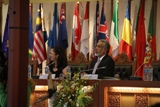Countries exchange experiences on EITI and Government Launches Procurement Portal

On Friday, August 26th, the Prime Minister opened the second day of the regional conference on Extractive Industries Transparency Initiative (EITI), held at the Díli Convention Centre.
Xanana Gusmão noted that "Our nation, which will soon celebrate 10 years of Independence, has a reason to rejoice in the way it has managed its natural resources."
He recalled the establishment of the Petroleum Fund in 2005, the recent amendment to the Petroleum Fund Law and Investment Law "to improve even more, good governance and transparency of the Petroleum Fund (...) based on a high level of transparency and accountability". All these steps allowed Timor-Leste to become a "model of transparency" with regard to good governance, inclusiveness, transparency and civic responsibility.
As way of a challenge, the Prime Minister proposes to openly discuss "our views on how we can transform the wealth extracted from our land into concrete benefits for our people" and considers " it appropriate to discuss, within this “beyond the EITI" forum, how we can contribute so that the extractive industries become more accountable and transparent for the benefit of our peoples".
After Kay Rala Xanana Gusmão’s speech, it was the Minister of Finance, Emília Pires’s turn to proceed with the launch of the eProcurement (Procurement Portal), a new website that serves as a Procurement Information System and Contracts of the State.
As the Minister explained, the Procurement Portal allows Internet users to have access, in an interactive way, to the Government's proposals. These proposals are grouped by type of business, to clarify companies.
Users can also access and review all concluded contracts. The Public Procurement Portal is accessible to the public, non-governmental organizations, companies and development partners and ensures that all proposals for public entities are put into a single site. All results from acquisitions, as well as all its procedures, changes and instructions, are published and transparent.
During this second day of the conference, there was time for three discussion sessions. The first focused on "Reflections and routes of the EITI implementing countries," the second session on "Transparency and stability: an assessment of the transparency model of Timor-Leste." The latter was divided into parallel sessions, where one group received the theme "Countries Candidate to EITI: status update and ways forward" and to the other "Civil Society and the EITI process: challenges and benefits."
In the first session, Timor-Leste, Mongolia and Liberia spoke of their routes and difficulties encountered, the objectives achieved and a few challenges they still face. In the second session, discussion was on the importance of transparency and good revenue management for the benefit of the population. Successful implementation and the need for respect and political support as well as integration in society, guarantees the transparency process.
The last session addressed mainly the involvement of civil society in the EITI process, the dissemination of information and the need for materials available in local languages, and also the levels of complexity of integration in the EITI.
In his closing speech of the conference, the President of the National Parliament, Fernando Lasama de Araújo, reiterated the importance of transparency, congratulating Timor-Leste for the fact of being able to provide this exchange of experiences between countries, taken as an example amongst all.
To see Prime Minister speech, please click here.










































